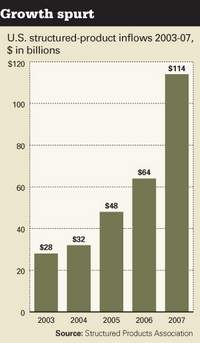BW Magazine
They're the bespoke suits of the investment world—financial products that can be designed to meet almost any investing goal. They don't look so fancy at first glance. They're bonds, basically, backed by a bank. It's the financial accoutrements layered on that basic frame that distinguish these products and lead to their name: structured notes.
 Most of these products share a common foundation in pairing a Treasury or corporate bond with an options contract; the option bets on the direction of a stock or stock index over time. The above-average income some products offer is part of their appeal in a low-rate environment. But it's the options contracts that give a "have your cake and eat it too" aspect to the deal. While enjoying steady income, investors can maintain exposure to the stock market and cap potential losses—and, in a trade-off some notes require, gains.
Most of these products share a common foundation in pairing a Treasury or corporate bond with an options contract; the option bets on the direction of a stock or stock index over time. The above-average income some products offer is part of their appeal in a low-rate environment. But it's the options contracts that give a "have your cake and eat it too" aspect to the deal. While enjoying steady income, investors can maintain exposure to the stock market and cap potential losses—and, in a trade-off some notes require, gains.The use of structured products has grown rapidly, with their total value more than quadrupling, from $28 billion in 2003 to $114 billion in 2007. About half of that $114 billion was sold to individuals by brokers or financial advisers. The number of notes is growing as well. In May, 2007, there were 437 structured products aimed at individual investors, valued at $2.4 billion; in May, 2008, there were 634, with a total value of $4.2 billion, according to data from StructuredRetailProducts.com.
While it's smart to be wary when pitched complex products, it's easy to see why more investors are intrigued. The notes can be designed for almost any goal, from protecting retirement dollars to aiming aggressively at high returns. "There's a seemingly endless amount of them out there," says adviser Brent McQuiston of Scottsdale-based Wealth Trust-Arizona.
Principal protection notes, geared to insure against market losses, are popular now. They let you participate in some of the upside of a stock index, and if the index drops, you don't take a loss. "Investors don't want to lose money, even if it means giving up some gains," says Neel Tiku, a financial planner at Peak Financial Management in Waltham, Mass.
Notes that offer double-digit yields, but come with far higher risks than typical fixed-income products, are also strong sellers.
For the full article in Business Week, click here.




No comments:
Post a Comment